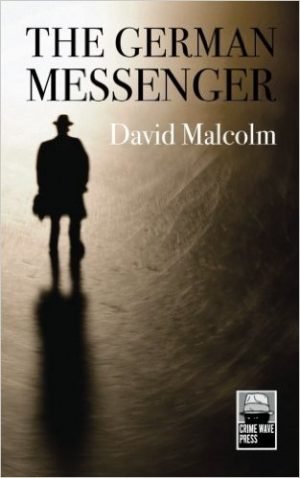
England, December 1916. The most destructive battle in world history has finally ended at the Somme and Europe is in the paralysis of a trench warfare. It seems no-one can win. Harry Draffen is a major in military intelligence. He has such a mixed family background that he can pass as an Englishman, Scot, Pole, German or Lithuanian.
He spies for a living, and in doing so lives in a world where he is accepted in many places, but loved in none. One of the few men he respects, intelligence boss Sir Walter Bullivant, is physically withered and wasted by cancer, but his final wish is that Draffen should investigate a major espionage initiative by Germany. It exists only in whispers and glances between dangerous men, but unless it can be thwarted, it could mean the end for Britain and its allies.
Draffen pursues The German Messenger across Britain, from the streets of Whitechapel, via an Oxford College and a bleak Scottish headland to a terrifying finale on a wet London rooftop. The violence is explicit, and there are sexual encounters which a lesser writer than David Malcolm might have failed to connect to the narrative.
Betrayal and double-dealing are everywhere. Draffen and his brutal Glasgow enforcer Alan McLeish find that they have become just as abhorrent to the British as they have always been to the Germans. Cut adrift in these hellish waters, with only their wits and their propensity for instant violence to protect them, Draffen and McLeish go from one brutal encounter to another, without fully realising how their intensity is alienating them from the men who employ them.
If this book were filmed it would have to be in a moody monochrome, just like an old noir movie. There would be intense close-ups of faces half in the shadows; there would be dramatic silhouettes, flashes of harsh lighting, and lingering shots of smoke spiraling towards the ceiling of a bleak and shabby room in a rotting tenement.
Harry Draffen is far removed from the clean limbed patriot of the time exemplified by Richard Hannay in The Thirty-Nine Steps, and Carruthers in The Riddle of the Sands. Draffen disgusts himself almost as often as he disgusts others. You will suspect that his lack of a clear moral code is more likely to be an honest portrayal of men such as him, than the clean-shaven earnestness depicted by John Buchan and Erskine Childers.
David Malcolm is a Scot by birth who now lives in Poland. He projects much of his awareness of Central European history and folklore into the world-weary thoughts of Harry Draffen who, addicted to his murderous skills, has a scholarly love of Heine and Goethe.
The book is shot through with beautiful prose and bitter poetry. The moment when Draffen reflects that he is as adept at killing women as he is at making love to them, is grimly revealing. There is plenty more of Harry Draffen’s story to be told. We are left unsure as to whether this will be in the future, or tales of his earlier exploits, but David Malcolm has created a dark, compelling character with the power to fascinate still further – in the same way that you might be transfixed by the movements of a deadly spider.
For more World War I crime fiction, click here.
Crime Wave Press
Print/Kindle
£4.91
CFL Rating: 5 Stars









